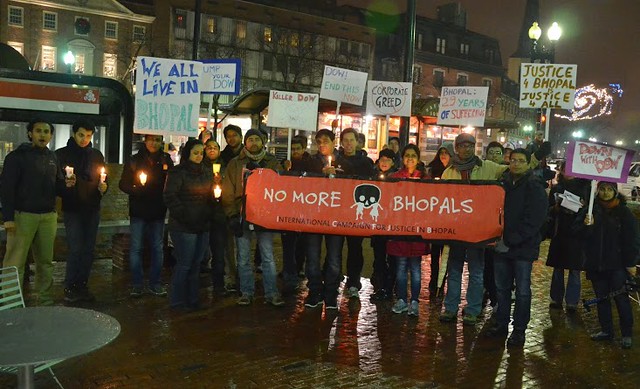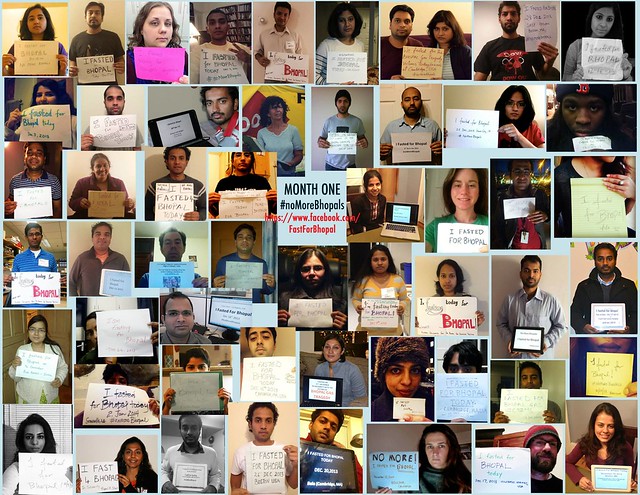By TCN News,
Cambridge, MA, USA : One month after Harvard students and community organizations launched a year-long fast in support of the survivors of the Bhopal Gas Disaster, support for their cause is growing.Over 50 people fasted for a day in December and organizers expect hundreds more to join in coming months. “The outpouring of spontaneous support for the fast in the first month has been heart-warming and we hope to build on it as we enter the 30th anniversary year of the disaster”, said Shashank Shukla, a graduate student at the Harvard Kennedy School of Government and one of the organizers of the campaign.
On December 3rd, 1984 in Bhopal, India, a lethal explosion at a Union Carbide (now Dow Chemical) pesticide plant in the middle of the city killed 8,000 people instantly and poisoned thousands. 347 tons of hazardous waste still lie at the site, and widespread soil and groundwater contamination has led to high incidence of cancers and birth defects. In 1989, Union Carbide negotiated a secret deal with the Indian government paying about $400 for each victim. The deal was struck with no consultation with survivor groups and vastly under counted the people affected. In 2001 UC was acquired by Dow Chemical which has since refused to acknowledge responsibility for the actions of its subsidiary. Dow is now facing criminal charges in Indian courts.

The 365-day relay fast which has attracted national media coverage in India was launched in coordination with the International Campaign for Justice in Bhopal (ICJB) a coalition of survivor groups and international solidarity organizations many of whom have been working on the issue for three decades.The goal of the fast is to draw attention to key survivor demands: clean-up of the contaminated site, medical relief and economic rehabilitation of all survivors, and prosecution of Dow Chemical, whose subsidiary Union Carbide’s pesticide factory was the site of the 1984 disaster. Pooja Parameswaran, an ICJB organizer and a Cambridge based scientist believes that public opinion is key to changing the situation.“The fast is a vehicle to mobilize support around the world. Both Dow and the Indian government realize that Bhopal is a huge blot on their international image and it’s not something that they can wish away”, she said.
Reena Shadaan of ICJB–North America believes that this is a critical year for the campaign, “For me the 30th anniversary is a call to action. It’s a disgrace that survivors have had to fight for justice for almost three decades” she said. “This is a situation that calls for global solidarity, so that we can ensure justice in Bhopal and in all places that people are struggling against corporate crime. Justice in Bhopal will set an important precedent.

The campaign uses a Facebook page where supporters upload their photos with a simple message on the day they fast.The page attracted over 400 followers in just a month and their content is already being seen by thousands of viewers. Some high profile activists in the US have also expressed their support. Noted environmentalist and author Diane Wilson was so moved by the campaign that she fasted for 30 straight days to express her support. On January 6, 2014, former NBC producer Bobby Lindsey from Texas started another 30 day fast to express his solidarity with the survivors demands.
Nitin Gujaran, a software engineer in Boston and a volunteer for the Association for India’s Development (AID) believes that the reason they are seeing such widespread support is because the lesson of Bhopal is universal. “People really respond to the message that this is part of a broader fight for a world in which there are no more Bhopals”, he said.
